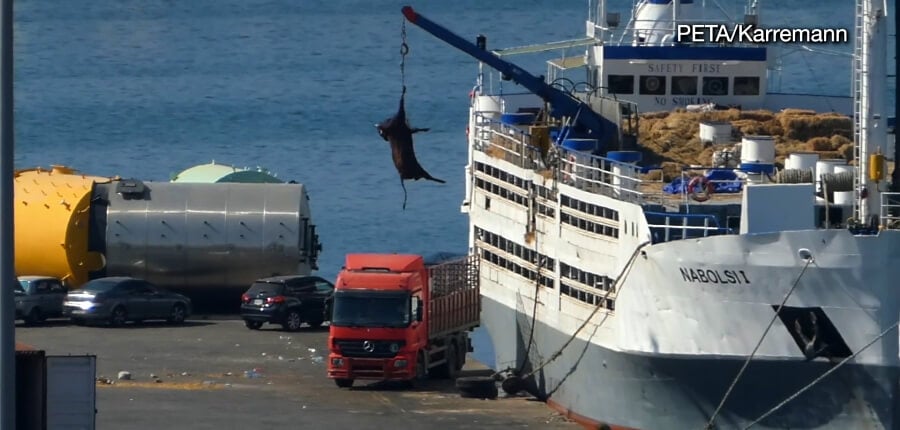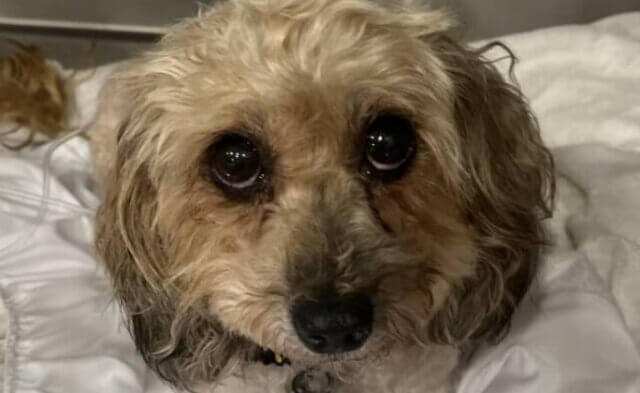Please enjoy this article from the latest issue of our magazine, PETA Global. To begin your subscription, become a PETA member today!
After being shipped halfway around the globe, in filthy conditions and without sufficient food or water, some cows are so weak or injured that they no longer have the strength to stand up. They’re treated as if they were cars or furniture – hoisted off docked ships by one leg with a crane (which can cause excruciatingly painful joint dislocations and broken legs) or kicked down a ramp to the dock, before being dropped onto a slaughterhouse-bound truck.
This is live export, and it’s just one of the many forms of abuse that cows, sheep, and other animals endure in the global leather and wool trades.
Investigative journalist Manfred Karremann’s new exposé, which was first released by PETA Germany and broke in the US via an exclusive in Vogue Business, shows the perilous, grueling journey of cows killed for leather.
From Berlin to Beirut
Each exploited animal is an individual – hurt, scared, and ultimately killed for a sweater, jacket, glove lining, car seat, hat, or shoe. More than 1.4 billion cows, sheep, and goats and millions of other animals, some pregnant or nursing, are killed for leather every year. Investigators documented Brazilian cows transported for weeks on ships bound for Turkey. From there, some animals continue on to Iraq in trucks. German and Austrian cows were traced all the way to Lebanon. Sheep go from South Africa across the ocean and beyond.
During these arduous voyages, scared and seasick animals endure heat and cold with no protection and stand huddled tightly together in their own excrement. They can’t help but jostle each other as the ship shifts, causing injuries. If they fall down, they can be trampled to death.
In many countries, animals are not stunned before their throats are slit. They’re simply pushed to the ground, sometimes bound miserably by all four legs before being slashed with a knife. Video recorded in Libya and Lebanon shows that workers kill cows and sheep in full view of other animals and throw them onto a pile to let them bleed out, while they struggle and writhe in pain.
Getting Under Their Skin
Karremann has worked with PETA for decades to expose the horrors of the skins trade. In 1999, he and PETA President Ingrid Newkirk documented the grueling death marches that cows face in India, Ingrid’s childhood home. Forced to trudge for 50 to 100 miles (80 to 160 kilometers) without sustenance to states where slaughter is allowed, the animals are desperately hungry, parched, exhausted, and often lame or ill – and many collapse. Herders mercilessly break their tailbones, smear chili peppers and tobacco into their eyes, and beat them severely to make them keep moving.
Karremann and PETA Germany also investigated the billion-dollar leather industry in Bangladesh, where conscious cows’ throats are cut and they struggle to escape even as their skin is torn off – and where child workers stand in toxic chemicals while they soak the animals’ hides.
Wool’s Link to Live Export
PETA and Animals Australia’s revelations about ships sent to the Middle East from Australia – carrying discarded sheep, who suffer mightily – caused a scandal, but the shipments continue.
‘Fleather’ Is Fashion-Forward
Designers and retailers are increasingly embracing innovative and sustainable vegan leather – made from apples, cork, mushrooms, paper, tea, and other animal-free materials – a sign of how much progress PETA and its affiliates have made in exposing the suffering involved in the skins trade. PETA India presented Kanpur Flowercycling with an Innovation in Fashion Award for its Fleather, a biodegradable leather made from discarded temple flowers that would otherwise end up in the Ganges, and H&M now uses the “PETA-Approved Vegan” logo on its vegan leather jackets.
Take Action Now
Shed leather and wool, and encourage everyone you know to do the same. Please visit PETA.org/VeganLeather to find out why vegan leather is the future of fashion. Shop for leather- and wool-free fashions at PETAMall.com.





